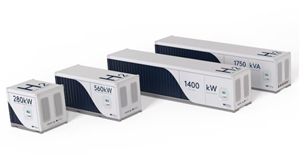News
EODev launches a range of high power H2 generators
EODev, a French developer and manufacturer of zero-emission electro-H2 power generators, announced the commercialization of packaged solutions over the entire power range, from 10 to 1,750kVA. The first models of this new range will enter production in 2024 and will be available on order from the first half of 2023.
Recognized as a leader in H2 power generators, EODev is now deploying a complete offer to offer real carbon-free electricity production when standard grid supply is non-existent, faulty or limited. The objective is to avoid the emission of 30 MMt of CO2 over the next 10 yr.
EODev develops internationally through sales and distribution agreements already covering Europe, North America, the Middle East and even Oceania. The assembly line installed in Montlhéry (91) now delivers one GEH2 with the Certified France Origin label per day to respond to the exponential growth of orders.
EODev now initiates the second phase of its product development by expanding its range to offer new plug and play solutions for both its existing customers, such as equipment rental leaders Loxam and United Rentals or event companies like GL events, and new markets such as grid power back up or fast EV charging.
“The acceleration of our geographical and technological deployment continues. We have demonstrated our know-how, the reliability and the validity of our products throughout the world. Whatever the applications, the replacement of diesel gensets by zero emission solutions using hydrogen is possible. The GEH2 is a relevant device for the development of electric mobility, last-mile fleet delivery the electrification of construction machinery, or when the grid is faulty or non-existent. This new range will allow us to respond to many requests but also to continue to develop simple, effective and realistic solutions,” said Stéphane Jardin, EODev's chief commercial officer.
On land. The new high power GEH2 modules are available in two complementary models, which can be combined to adjust the offer to the needs: a 20' container version of 350kVA, and a 40' container version of 1,050 kVA. This range is completed by a 280kW module specifically designed for EV charging, in a 20' container, but also by a modular 10kVA Mini GEH2, to meet, among other things, the needs of the telecoms industry, or even to be used as network backup for the residential market during outages resulting from natural disasters or caused by tensions on the grid.
The high power provided takes on its full meaning for highly sensitive applications such as energy security for industrial and airport facilities, hospitals, water treatment plants, data centers, or even for power plant peak shaving; but also, for applications already covered by the 110kVA GEH2 on construction sites or for events by increasing the range of possibilities — as demand is already strong for the new 350kVA GEH2.
At sea. The 2nd generation of the REXH2, in the process of Type Approval Certification (or TAC) paves the way for the development on the same bases of three more powerful modules ranging from 280kW (10' container) to 1,400kW (40' container) with a 20' container version of 560kW in between. Designed to be able to operate in parallel, these three new REXH2 will be able to meet the needs of large and highly energy-intensive vessels, in particular cargo ships such as the upcoming Energy Observer 2.
Finally, the arrival of the REXH2 in an 8kW version is intended to help decarbonize most of the fleet of recreational boats and meet the growing demand for small motorboats and sailboats to be zero emissions.
“These last few years have allowed us to acquire leading know-how in the design and management of fuel cell systems in order to optimize their efficiency and lifespan. Two key points if we want to offer competitive and effective long-term solutions. The new range is the expression of this know-how in research and development and the result of the experience gathered from our operations thanks to our customers around the world. What we did not anticipate, however, is the acceleration of demand and the need to move faster than expected, especially beyond Europe,” said Jérémie Lagarrigue, EODev's CEO.


